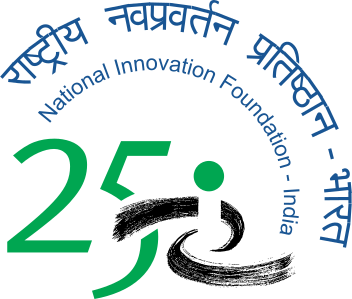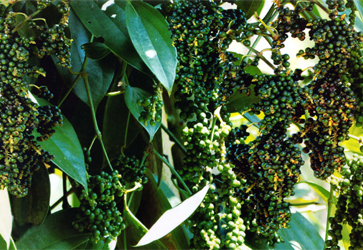Pepper Thekken - an improved high yielding variety of Pepper
T.T. Thomas (71), a farmer from Idukki, Kerala is known for developing “Pepper Thekken”, a high yield variety of pepper which gives a yield of more than 1000 pepper balls in one pepper bunch. The specialty of this variety is that its spikes are fully branched while other pepper varieties are single spiked without branches.
Originally hailing from Kottayam, Thomas is a farmer with deep interest and wide knowledge in agriculture research. His family includes his wife, a son and a daughter. Both of them are married. Both his wife and son have been assisting him in his agriculture activities and are a source of great moral support. Born in an agricultural family, Thomas had keen interest in agriculture since childhood, which was nurtured by his mother, who was a great inspiration for him. The family had eight acres of land. Before going to and after coming from school he used to go to the field for cutting and collecting grass and fodders for cows. Though his father was very strict, mother was always supportive and motivated him to know and learn all agricultural activities. An average student, Thomas discontinued studies after class 8 as high school was far from his home. He then got fully involved in agriculture at the age of fifteen.
Migration to the high ranges was a trend among the farmers in his village at that time. This was mainly because of the availability of cultivable forest land at cheap rate. In 1962 soon after him discontinuing education, his family also migrated to high ranges of Kattapana, Idukki District. Facing hardships initially managing wild animals, difficult terrain and extreme climate, the family managed to obtain land on lease from forest department for cultivation. Forest land after cutting the trees was available for cultivation for a limited period and farmers had to bid for the land. They cultivated paddy, cassava, yam, cardamom etc in the forest land.
A chanced observation during a walk in the forest
The higher ranges were known for cardamom cultivation. But Thomas’s family did not have sufficient knowledge about cardamom cultivation. Frequent failure of the crop forced them to shift to pepper cultivation, which was another spice cultivated in the area. He and his friends used to visit nearby forests to observe wild varieties of vegetables and crops such as pepper, nutmeg, cardamom etc. Sometimes, he used to collect these and plant them in his field.
About twenty five years back while walking through a forest he noticed a different and unique type of pepper plant with branched spikes. He brought this plant from the forest and grew it in his farm. Amazed by the unique branching of spike, he started taking care of it, observing the plant closely. The plant responded well to the care given. In the forest though the plant grew in shade, but he planted it in the sunlight and gave organic manures and bone meal. He noticed that the roots of this pepper plant could grow in water also, which was not possible in normal cases. The plant showed vigorous growth and thereafter, he started multiplying his plant in his farm and gave his house’s name to the variety.
Pepper Thekken variety was developed by grafting the pepper plant obtained from the forest on the root stick of Pepper Colubrinum, a disease tolerant wild pepper from Brazil. Now he has mass multiplied the grafted thekkan pepper plants through stem cuttings. It has to be specially mentioned here that grafting of pepper is not commonly used for commercial purposes but Thomas has been successful in practicing this.
Pepper thekken: an improved pepper variety
The variety is an improved high yielding pepper variety with highly branched spikes resistant to quick wilt disease.
Pepper Thekken is noted for its highly branched spikes, which result in high yield. Eight hundred to thousand berries can found in a single spike of this variety against 60 to 80 berries in locally popular variety. The berries are present on both main and branched spikes. Increased Lateral branches with more nodes and inter nodes, resistance to insects and diseases particularly quick wilt, thin epidermis, negligible air cavity etc are other distinguishing features of Thekken. The negligible air cavity leads to the enhanced dry weight. About 8600 kg dry pepper can be produced from one hectare. Since the pepper is produced in bunches, harvesting is also easy. Having bearing period of three years, the variety is found to be pest and disease resistant and tolerant to adverse climatic conditions. Thomas has been cultivating this variety for the last twenty five years using only organic manure, cow dung, vermin compost etc.
Ninety per cent of the pepper in the area is affected by the quick wilt disease (locally known as vattam), which is a fungal disease caused by the phytophthora (Palmivara var. piperis). This disease affects the roots of the pepper plant during the monsoon season. Thomas shared that Thekken is not affected by this disease as it is grafted on Pepper Colubrinum, a wilt tolerant pepper variety. He further informed that grafting is done at a height of 50cm to prevent pepper strings from touching the soil directly.
Indian Institute of Spice Research (IISR), Calicut has recognized this variety as a unique high yielding variety and remarked that this variety has a characteristic branching of spike, which is rare feature in black pepper.
Thomas has sold more than 5000 grafts in Kerala itself, mainly in Idukki, Aleppy, Pathanamthitta and Wayanad districts. He has also been able to sell more than 1000 grafts outside Kerala, mainly in Goa and Karnataka. Recently, a Tata group company from Assam also placed an order for this variety.
Recognising the effort
Considering his vast experience, Thomas has been invited in many meetings, trainings, workshops and seminars organised by Agriculture department and Farmer groups. He has always attended these meetings with great interest and shared his experiences with others. For his Thekken variety, he was also invited by ICAR for an exhibition in Mysore. He has also been honoured by Krishi Vigyan Kendra, Kannur. He also talked about his “Pepper Thekken” in Farmer’s Science Congress.
Earlier, Thomas had got a consolation award in NIF’s First National Competition for developing a herbal formulation from tulsi (basil) leaves for preventing insect attack, especially from green worms and thrips in Cardamom. Peermade Development Society supported him for developing a nursery of Thekkan. In 2006, he was honoured during the Shodhyatra organized by SRISTI and Peermade Development Society in Idukki. NIF also invited him to participate in the Innovations’ exhibition at the President House in 2011, which he considers as the most precious moment of his life. His works have extensively been covered by the media, which has helped him get more sales from different parts of the country.
His farm boasts of a variety of crops such as strawberry, tomato, Italian malta, brinjal grafted in chunda, jack fruit without latex and different types of medicinal plants. He has maintained his passion for agriculture even at this age and is now working on improving productivity in ginger. Thomas mentions that agriculture is a form of art just like music and believes that only talented, interested and perseverant can be successful.
“Oru anweshakan eppoyum velluvilikale neridan theyarakanam. Thudakathil prathisanthikal neeridendi vanallum vijayam anthimam aayirikkum”
(The innovator should take risk. Though he may face some temporary setback, in the long run he will eventually succeed)
NA
NA
NA
NA








